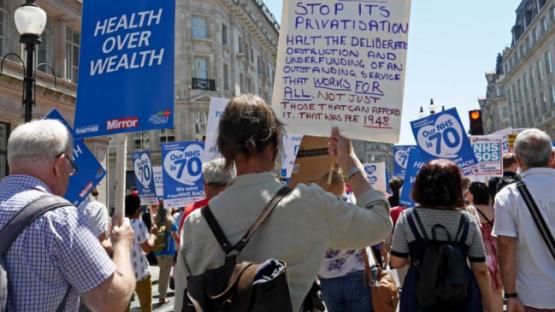
Amazon Alexa/NHS contract: ICO allows partial disclosure
The Information Commissioner's Office issued a decision on our complaint relating to the failure by the UK Department of Health and Social Care to disclose the full, unredacted contract with Amazon.
PI obtained a decision by the ICO ordering the disclosure of a section of the contract between the UK Department of Health and Social Care and Amazon.
- In a 2019 Freedom of Information request, PI asked the Department for Health and Social Care to disclose its contract with Amazon
- The contract disclosed was heavily redacted, raising significant concerns as to the true nature of the partnership
- In early 2020, PI made a complaint to the ICO to seek the publication of the unredacted version of the contract

Back in 2019, UK Health Secretary Matt Hancock announced a partnership between the NHS and Amazon Alexa. The goal of the partnership was for Alexa to be able to use the content of the NHS website when people asked health-related questions.
At the time, we expressed a number of concerns regarding this agreement: Amazon did not appear to be an actor that should be trusted with our health information, and seeing the Health Secretary publicly praising this new agreement appeared to give Amazon unwarranted legitimacy when it comes to our health data.
We also feared this agreement would give the Health Secretary a ground for further cuts to traditional helplines and sources of information normally provided by the NHS.
As part of our research, we asked health questions to an Amazon device. We noted that Alexa did not have an answer for many of those or would give us an answer from organisations they had signed other partnerships with, like the Mayo Clinic in the US. In other words, it was not exactly clear to us what the NHS was getting out of this.
We requested the Department of Health for their contract with Amazon and we were faced with a contract that was largely redacted. As we asked for an unredacted version of the contract, the Department of Health argued that the commercial interest of Amazon superseded the public interest in favour of disclosure. We decided to challenge this claim before the Information Commissioner’s Office.
Fast forward a year later and the ICO has now published its decision. While the ICO did not order the full release of the contract, as we had hoped, we are pleased to see that they asked for the disclosure of a redacted clause in the contract. We will report on any relevant content contained in the annex as soon as we obtain it.
The ICO also found that the redacted sections did not pertain to data collection. Yet the current Covid crisis has shown the limits of “tech solutionism” beyond the data protection and privacy issues. The belief that tech companies’ “quick fixes” are more efficient than investing in often expensive traditional human skills was proved wrong during the pandemic. As people suffering from Covid were asked to stay home and call 111, Alexa proved herself utterly useless. We need actual people to make an assessment of people’s symptoms and whether or not they are life-threatening. Yet, at the start of the pandemic in March 2020, people were asked to refrain from calling 111, because the helpline was overwhelmed with calls from people who needed answers and reassurance from real professionals, not an AI-powered voice assistant.
The Alexa/NHS contract therefore highlights a problem beyond data protection and privacy: what kind of healthcare do we want to have and how much are we ready to invest in it?



